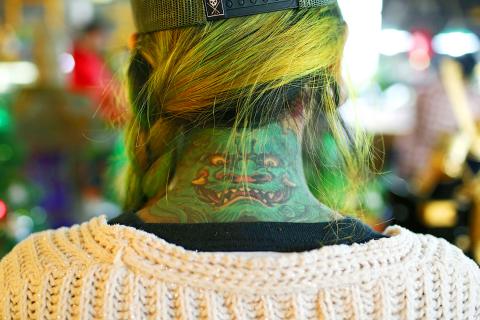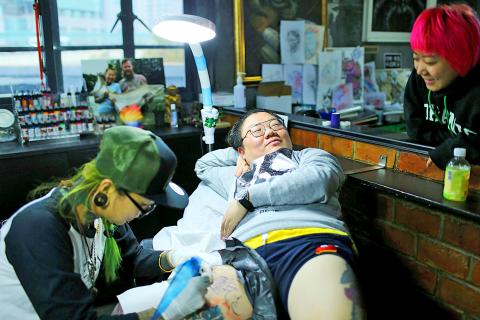Once the mark of criminals or sex workers, for centuries tattoos have been stigmatized in China but the growing influence of celebrity culture is changing all that — particularly for women.
Nowhere is the trend more evident than in Shanghai, China’s most cosmopolitan city and recently dubbed “China’s tattoo mecca” by the country’s state media.
Body art for women has long been frowned upon in socially conservative China, but studios are mushrooming throughout the city of 24 million.

Photo: AFP
Zhuo Danting, widely considered one of China’s top tattoo artists, has witnessed first-hand how the industry has exploded. The 35-year-old has 70 percent of her body tattooed and has been operating her own Shanghai studio for 11 years.
Inspired by celebrities and sports stars, unprecedented numbers of mostly younger Chinese are getting inked, Zhuo said at her shop, Shanghai Tattoo.
“At the beginning, of course, they just give you a weird look, they’re freaking out,” Zhuo, who also has multiple piercings and dyed green hair, said of the reaction she gets on the street.

Photo: AFP
“But now there are a lot of people getting tattoos, it’s getting more and more popular. People see them everywhere so they don’t see it as a big deal,” she added.
Zhuo, who got her first tattoo at 16 and has inked both her parents, is originally from Harbin, a city in China’s far north.
There is a growing body art scene there too, she said.
“There is a lot of change. Before, not many people get tattoos. They thought that people with tattoos, that person must have been in jail or you are a bad person.
“Now it’s a cool thing, to represent yourself as different.”
CHANGING TIMES
In imperial times, convicts were sometimes tattooed as a lifelong reminder of their crimes, and tattoos later were used by Chinese triads to signify gang loyalties.
But Zhuo said attitudes towards women with tattoos have changed rapidly in the last three years, and the Chinese are increasingly experimenting with their body art.
“Before, when you saw a woman with a tattoo, it was usually just a small one,” she explained, adding: “But now you can see everywhere that they are having full sleeves, or chest, or full back.”
Wang Qi, a web designer, is about to have Zhuo tattoo her already heavily inked right leg.
The 29-year-old has several body designs, including an hourglass to remind her of the preciousness of time, and a sailboat and lighthouse inspired by her love of the sea, as wells as tattoos of a snake’s head and a crocodile’s eye.
Her latest inking: the Chinese characters for her grandmother’s name on the inside of her thigh.
“Ten years ago, only 10 percent of people could accept women doing this. But now at least 60 to 70 percent of people can,” Wang said, while adding that quality can vary widely.
The trend has spawned extreme examples, including a couple in northeastern China who covered themselves in patriotic artwork, including a Chinese flag on the man’s face.
Reliable figures are elusive, but Hu Deliang, former head of the China Association of Tattoo Artists, estimates there are about 200,000 such artists in the country.
The Shanghai tattooist said women now account for at least 60 percent of his customers.
“Back in 2002, only about 20 percent were female and most of them worked as escorts in nightclubs or that kind of industry,” Hu said.
China’s increasing prosperity, meanwhile, means more women now can afford tattoos, which can cost thousands of yuan (hundreds of US dollars) and previously would have been considered an unjustified splurge.
Peng Lin, who has the Italian phrase La vita e bella (Life is beautiful) among her three tattoos, is one of the few in her circle of women friends with a tattoo, but many are considering it, she said.
“Before, people may think women getting tattoos is sort of off-the-mainstream behavior, but now they all appreciate them when they found out that tattoos can be pretty and artsy,” said Peng, 31, who works in advertising in Shanghai.
QUALITY CONTROL
Tattoos are still frowned upon in government positions and at many companies, however, while some women complain that their husbands or partners object.
“Even now people are judging, they don’t think that people should get big tattoos, especially women,” said Zhuo, who has tattoos across both sides of her scalp.
“Still, people think it’s more acceptable for men to get a tattoo than women and some get smaller ones to hide it from older family members or work.”
Zhuo said lack of official oversight makes it “too easy” to open a parlor. She often sees customers who ask her to fix shoddy work done elsewhere.“Sometimes I can see some good work, but not much. The percentage of good tattoos is quite low right now,” she said.
“Tattoo is still a new thing in China. A lot of new people become tattoo artists pretty soon, but there’s still a lot to learn.”

Behind a car repair business on a nondescript Thai street are the cherished pets of a rising TikTok animal influencer: two lions and a 200-kilogram lion-tiger hybrid called “Big George.” Lion ownership is legal in Thailand, and Tharnuwarht Plengkemratch is an enthusiastic advocate, posting updates on his feline companions to nearly three million followers. “They’re playful and affectionate, just like dogs or cats,” he said from inside their cage complex at his home in the northern city of Chiang Mai. Thailand’s captive lion population has exploded in recent years, with nearly 500 registered in zoos, breeding farms, petting cafes and homes. Experts warn the

The unexpected collapse of the recall campaigns is being viewed through many lenses, most of them skewed and self-absorbed. The international media unsurprisingly focuses on what they perceive as the message that Taiwanese voters were sending in the failure of the mass recall, especially to China, the US and to friendly Western nations. This made some sense prior to early last month. One of the main arguments used by recall campaigners for recalling Chinese Nationalist Party (KMT) lawmakers was that they were too pro-China, and by extension not to be trusted with defending the nation. Also by extension, that argument could be

Aug. 4 to Aug. 10 When Coca-Cola finally pushed its way into Taiwan’s market in 1968, it allegedly vowed to wipe out its major domestic rival Hey Song within five years. But Hey Song, which began as a manual operation in a family cow shed in 1925, had proven its resilience, surviving numerous setbacks — including the loss of autonomy and nearly all its assets due to the Japanese colonial government’s wartime economic policy. By the 1960s, Hey Song had risen to the top of Taiwan’s beverage industry. This success was driven not only by president Chang Wen-chi’s

Last week, on the heels of the recall election that turned out so badly for Taiwan, came the news that US President Donald Trump had blocked the transit of President William Lai (賴清德) through the US on his way to Latin America. A few days later the international media reported that in June a scheduled visit by Minister of National Defense Wellington Koo (顧立雄) for high level meetings was canceled by the US after China’s President Xi Jinping (習近平) asked Trump to curb US engagement with Taiwan during a June phone call. The cancellation of Lai’s transit was a gaudy